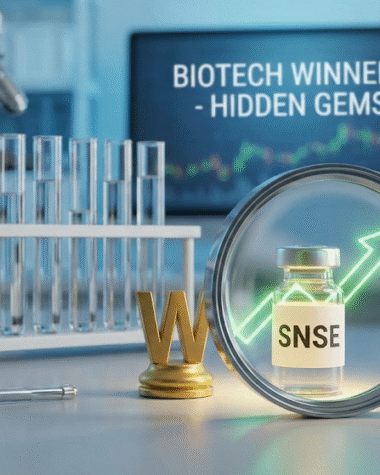Salarius Pharmaceuticals Inc. (NASDAQ:SLRX) is a clinical-stage biopharmaceutical company dedicated to developing transformative therapies for patients suffering from rare and aggressive cancers. Headquartered in Houston, Texas, Salarius is pioneering advancements in epigenetic modulation and targeted protein degradation, two of the most promising frontiers in cancer research. The company’s mission is to provide new hope for patients who have limited or no treatment options by targeting the underlying molecular mechanisms that drive tumor growth and resistance.
Founded with a focus on addressing unmet medical needs in oncology, Salarius initially gained recognition for its development of seclidemstat, a novel, oral LSD1 (lysine-specific demethylase 1) inhibitor. This compound, which represents a significant step forward in epigenetic cancer therapy, is being evaluated in clinical trials for hematologic malignancies such as myelodysplastic syndromes (MDS) and chronic myelomonocytic leukemia (CMML). Supported by data from ongoing investigator-initiated studies at top-tier institutions like MD Anderson Cancer Center, seclidemstat has shown meaningful activity in high-risk patient populations where conventional therapies often fail. Salarius has also received funding support from the National Pediatric Cancer Foundation and the Cancer Prevention and Research Institute of Texas, underscoring the broader scientific community’s confidence in its clinical approach.
Beyond seclidemstat, Salarius is expanding its pipeline through a second lead program, SP-3164, a next-generation oral protein degrader that leverages cereblon-binding mechanisms to selectively eliminate disease-causing proteins. Developed using deuterium-enabled chiral switching, SP-3164 is designed to improve the efficacy, safety, and durability of first-generation degraders, particularly in solid tumors and hematologic cancers. With a recently granted U.S. patent providing strong intellectual property protection, SP-3164 strengthens Salarius’ position in the rapidly growing global protein degradation market.
In a strategic move to further diversify and accelerate its pipeline, Salarius is now pursuing a transformational merger with Decoy Therapeutics, a preclinical-stage biotech company specializing in AI-driven peptide conjugate therapeutics. Through this business combination, Salarius is set to expand into new indications, including respiratory infectious diseases and gastrointestinal cancers, while integrating Decoy’s proprietary IMP³ACT™ platform for computational drug design and rapid peptide synthesis. This merger marks a significant evolution of Salarius from a focused oncology innovator into a next-generation, multi-platform biopharmaceutical company.
As of early 2025, Salarius remains lean and capital-efficient, with a strong emphasis on strategic execution, data-driven development, and scientific collaboration. The company’s dual-platform approach—combining epigenetic inhibition with targeted degradation and peptide conjugate therapies—positions it at the cutting edge of oncology and infectious disease research. With key clinical updates on the horizon, a potentially game-changing merger in progress, and a commitment to addressing some of the most pressing challenges in medicine, Salarius Pharmaceuticals is poised for a new era of growth and discovery.
Seclidemstat: Strong Clinical Signals in Hematologic Cancers
Seclidemstat, the company’s lead investigational drug, is a reversible LSD1 inhibitor with promising clinical activity in treating rare and underserved hematologic cancers such as myelodysplastic syndromes (MDS) and chronic myelomonocytic leukemia (CMML). The compound is currently being evaluated in a Phase 1/2 investigator-initiated clinical trial at the world-renowned MD Anderson Cancer Center. According to the company’s March 2025 business update, the trial remains active and is enrolling patients, with clinical data updates expected later in the year.
Early results from this study are compelling. Previous trial data showed an overall response rate of 43% in patients with few remaining treatment options, a significant figure for late-stage, relapsed MDS. Additionally, the median overall survival of patients on the seclidemstat and azacitidine combination was reported at 18.5 months, outperforming historical benchmarks. Following a temporary FDA clinical hold in 2023, which has since been lifted, the continuation of this study underscores the drug’s favorable safety and efficacy profile in hematologic cancers. Seclidemstat’s ongoing clinical relevance, combined with Salarius’ commitment to strategic alternatives and external partnerships for this asset, keeps it well-positioned for further value realization.

CHECK THIS OUT: Johnson & Johnson (JNJ) can be the Next Trillion-Dollar Stock and Boston Scientific (BSX) Just Signed a $45M Deal—Here’s What It Means for Investors.
SP-3164: A Next-Gen Protein Degrader with Patent-Protected Potential
Beyond seclidemstat, Salarius is advancing its second core asset, SP-3164, a novel oral small molecule designed to selectively degrade disease-driving proteins via the cereblon E3 ligase pathway. SP-3164 is an optimized enantiomer of avadomide, stabilized using deuterium-enabled chiral switching, a cutting-edge platform that enhances potency and reduces off-target effects. The compound is preparing to enter clinical development, potentially transforming the company’s presence in the targeted protein degradation market—a sector that is projected to surpass $15 billion in value over the next decade.
Importantly, Salarius was recently granted a U.S. composition-of-matter patent for SP-3164, giving it up to 20 years of intellectual property protection. This strong IP position not only increases the long-term commercial value of the asset but also makes it an attractive candidate for strategic partnering or licensing agreements. As an IND-stage asset with clear differentiation from first-generation cereblon binders, SP-3164 reflects Salarius’ forward-thinking approach to oncology innovation and value creation.
The Decoy Therapeutics Merger: AI-Driven Peptide Therapeutics for Cancer and Viruses
In a major strategic development, Salarius announced in early 2025 that it had signed a definitive merger agreement with Decoy Therapeutics Inc., a privately held biotech leveraging artificial intelligence, high-speed synthesis, and proprietary platforms like IMP³ACT™ to rapidly engineer and manufacture peptide conjugate therapeutics. Decoy’s preclinical pipeline is focused on respiratory viruses, including avian H5N1 flu, and gastrointestinal oncology, offering an exciting diversification opportunity for Salarius’ clinical portfolio.
The newly combined entity—set to be named Decoy Therapeutics—is expected to introduce multiple value-creating inflection points throughout 2025 and 2026. Decoy’s pipeline has already attracted support from several prestigious sources, including Google AI, NVIDIA Inception, and BARDA’s BLUE KNIGHT™ initiative, a collaborative program with Johnson & Johnson Innovation. The access to non-dilutive capital, AI infrastructure, and governmental partnerships gives the combined company an unmatched head start in a fast-emerging category of bioengineered peptide therapies.
As part of the merger, Salarius’ SP-3164 will be integrated into a new generation of PROTAC-like conjugate therapeutics, bringing a novel twist to protein degradation by combining AI-driven peptide targeting with Salarius’ small-molecule degrader expertise. The merged company will also continue supporting the MD Anderson-led development of seclidemstat, providing continuity in hematologic oncology while expanding the platform to cover infectious diseases and GI cancers.
Financial Update: Lean Structure and Cost-Conscious Execution
For the full year 2024, Salarius reported a net loss of $5.6 million, significantly down from $12.5 million in 2023. This reduction reflects tightened R&D expenditures and disciplined capital allocation as the company transitions into its next phase. As of December 31, 2024, cash and equivalents stood at $2.4 million, expected to fund operations through the second quarter of 2025. The company is actively evaluating strategic financing options to ensure uninterrupted progress across both Salarius’ legacy pipeline and Decoy’s AI-driven initiatives.
This lean financial profile gives Salarius flexibility while limiting excessive dilution—a rare but welcomed trait among early-stage biotech firms. With the potential for new grants, partnerships, and institutional capital following the merger, liquidity concerns could be mitigated through non-dilutive growth and collaborative financing strategies.
Wall Street Outlook: Undervalued and Underfollowed with High Upside
Despite the transformational developments underway, Salarius remains a deeply undervalued micro-cap, trading below $1 with a market capitalization under $3 million. Yet, its assets—anchored by seclidemstat’s clinical promise, SP-3164’s IP-backed market potential, and the Decoy merger’s AI-driven momentum—paint a far more valuable long-term picture. As a result, the company has begun attracting interest from speculative biotech investors and clinical-stage institutional traders alike.
Technical momentum has also begun to shift. Increased trading volume, combined with bullish MACD and moving average crossovers, suggest that SLRX may be establishing a bottoming pattern. If upcoming trial updates or merger completion announcements beat expectations, the stock could experience sharp revaluation in line with other micro-cap biotech catalysts.
Conclusion: A Bold, Multi-Platform Biotech Emerging from the Shadows
Salarius Pharmaceuticals is no longer just a small player with a single epigenetic inhibitor. Through strategic partnerships, smart M&A, and next-generation science, it is emerging as a multi-platform biotech company poised to lead innovation across oncology, infectious disease, and precision peptide therapeutics. With active clinical trials, a strengthened patent estate, a capital-efficient operating model, and a high-profile merger in motion, Salarius offers one of the most asymmetric reward profiles in the current micro-cap biotech universe.
Investors seeking overlooked opportunities with legitimate science, low market expectations, and catalysts on the near-term horizon may find Salarius Pharmaceuticals an ideal candidate for high-risk, high-reward exposure in 2025 and beyond.
READ ALSO: This Tiny Surgical Robot Stock Could Disrupt a $30 Billion Industry: Microbot Medical (MBOT) and Pro-Dex (PDEX) Plunges 39% – Here’s Why Smart Investors Are Buying the Dip.








